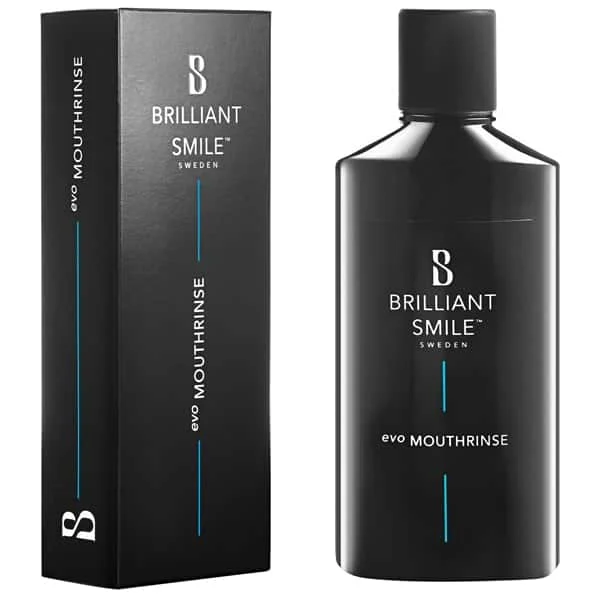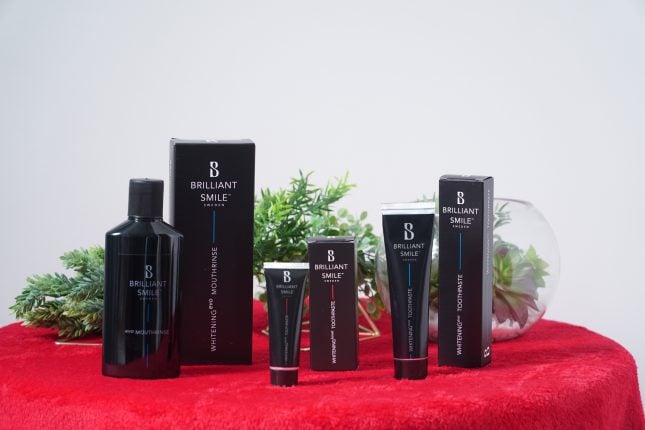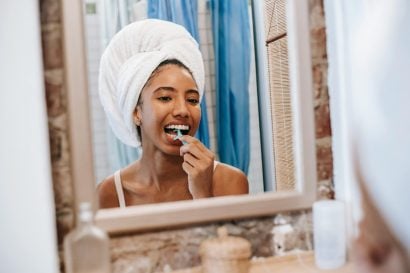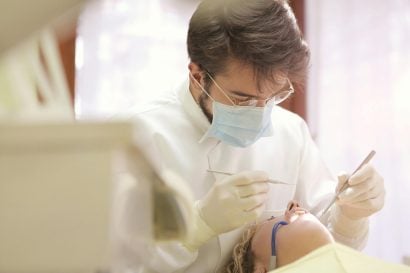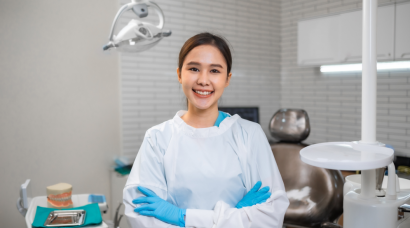- CPC (cetylpyridinium chloride) is a standout ingredient in many modern mouthwashes. It offers effective plaque reduction and fights bad breath without the harshness of alcohol-based formulas.
Should mouthwash be used daily?
Using mouthwash daily can be a beneficial part of a well-rounded oral hygiene routine. While it should never replace brushing and flossing, a high-quality rinse can help reduce plaque, freshen breath, and support gum health—especially in Bangkok’s warm, food-rich environment. For best results, choose a therapeutic mouthwash suited to your specific needs, and consult a dental professional if you’re unsure. The Smile Bar offers curated options safe for long-term use, especially post-whitening.
Mouthwash: Cosmetic vs. Therapeutic Explained
A mouthwash, or oral rinse, is more than a breath-freshening quick fix—it’s a powerful support to your oral hygiene routine. Cosmetic rinses offer a temporary burst of fresh breath with ingredients like menthol and eucalyptol. Therapeutic versions include active ingredients such as fluoride, chlorhexidine, and cetylpyridinium chloride, which help reduce plaque, manage gingival inflammation, and prevent tooth decay.
How Mouthwash Works in an Oral Hygiene Routine
Incorporating mouthwash into your daily oral care can make a noticeable difference. Whether you’re targeting gingival issues or just maintaining fresh breath in Bangkok’s climate, a good rinse complements brushing and flossing while reaching areas your toothbrush might miss.
What Makes the Best Mouthwash?
Fluoride and Enamel Protection
- Fluoride mouthwash helps prevent dental caries and strengthens enamel. Products containing fluoride are especially important for individuals exposed to sugary diets and acidic foods common in Thai cuisine. According to the American Dental Association, fluoride is key in preventing dental caries in children and adolescents and in maintaining teeth in adults.
Chlorhexidine: The Dentist’s Prescription Mouthwash
- Chlorhexidine mouthwash is often prescribed for short-term use to treat gingival inflammation and periodontal disease. These mouthwashes provide a significant reduction in gum issues, but they are best used under dentist supervision. Chlorhexidine can also be a temporary solution for oral lesions, sore gums, or post-procedure recovery.
Hydrogen Peroxide and Whitening Benefits
- Mouthwashes containing hydrogen peroxide or carbamide peroxide can aid in stain removal and help whiten teeth. These are ideal for clients undergoing LED whitening at The Smile Bar, as they help maintain results and reduce oral sores and tooth sensitivity.
Essential Oils in Mouthwash
- Essential oils like eucalyptol, menthol, and thymol serve as natural antiseptics. They not only refresh your breath but also kill bacteria. Mouthwashes with essential oils are often a gentler alternative to synthetic agents—ideal for those looking to stop bad breath naturally.
Cetylpyridinium Chloride: A Powerful Plaque Fighter
What Mouthwashes Contain and Why It Matters
Mouthwashes contain a mix of agents tailored for different needs—from fluoride to essential oils and CPC. When choosing, consider your goals: fresh breath, plaque reduction, gum support, or whitening.
How to Use Mouthwash Effectively
-
Swish 10mL undiluted for at least 60 seconds
-
Use it after brushing and flossing for complete oral cavity coverage
-
Avoid eating or drinking for 20 minutes afterward
-
Use before brushing with BrilliantSmile™ toothpaste if whitening
-
Consider mouthrinse use after meals, especially when enjoying Bangkok’s flavorful cuisine
Pro Tip: A travel-size antiseptic mouthwash is handy for long commutes or after sampling street food.
BrilliantSmile™ WhiteningEVO at The Smile Bar
Available exclusively at The Smile Bar Bangkok, this fluoride-based rinse contains tetrapotassium pyrophosphate and potassium nitrate. It’s designed to maintain whitening results and relieve sensitivity—ideal for long-term use post-treatment.
Where to Buy Mouthwash in Bangkok
-
High-end pharmacies like those in Central Embassy, EmQuartier, or Siam Paragon
-
Dental boutiques specializing in advanced oral care products
-
The Smile Bar—for whitening-safe, dentist-recommended rinses
Mouthwash may not replace brushing and flossing, but with expert advice and the right product, it becomes an essential part of your oral care journey. A cleaner mouth, brighter smile, and better breath await—right here in the heart of Bangkok.
Conclusion – TL;DR
Using mouthwash daily can support fresher breath, healthier gums, and longer-lasting whitening results—as long as you choose the right formula. Opt for alcohol-free, dentist-approved rinses like those at The Smile Bar Bangkok to safely enhance your oral care routine.
Frequently Asked Questions
Why do dentists say don’t use mouthwash?
- Some dentists caution against daily mouthwash use if it contains alcohol or harsh ingredients that may disrupt your oral microbiome or irritate tissues. It’s best to choose alcohol-free, dentist-approved rinses—especially if you have sensitive gums or are undergoing cosmetic treatments.
What mouthwash is good for gingivitis?
- Therapeutic mouthwashes containing chlorhexidine or cetylpyridinium chloride (CPC) are effective against gingivitis. These ingredients help reduce plaque and inflammation, but chlorhexidine is usually recommended for short-term use under dental supervision.
Which mouthwash has hydrogen peroxide?
- Whitening mouthwashes often include hydrogen peroxide or carbamide peroxide to help lift surface stains. These are ideal for clients maintaining LED whitening results, like those offered at The Smile Bar Bangkok.
Why does mouthwash burn my mouth?
- A burning sensation often comes from alcohol-based rinses or sensitivity to strong antiseptic ingredients like menthol or eucalyptol. Switching to an alcohol-free mouthwash with soothing agents like potassium nitrate can help.
What mouthwash has no alcohol?
- Many modern mouthwashes are formulated without alcohol to reduce dryness and irritation. Look for labels marked “alcohol-free,” or explore The Smile Bar’s curated selection of soothing, whitening-friendly options.
Will mouthwash help with thrush?
- Some antifungal mouthwashes may assist in treating oral thrush, but it’s essential to consult a healthcare provider for proper diagnosis and treatment. Over-the-counter rinses may offer relief but aren’t a substitute for medical care.
Should mouthwash be alcohol free?
- For many users—especially those with sensitive tissues or undergoing whitening—alcohol-free mouthwash is a safer, gentler choice. It still offers effective plaque control and breath-freshening benefits without the sting.
Can mouthwash whiten teeth?
- Yes, mouthwashes with hydrogen peroxide or carbamide peroxide can help maintain a brighter smile by reducing surface stains. They’re most effective as part of a complete whitening care plan like the one offered at The Smile Bar.


